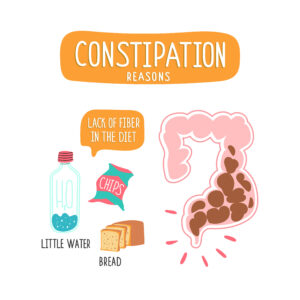Regularity
6 Constipation Triggers and How To Avoid Them
Constipation triggers are more common than most people realize, and they can sneak into your daily routine without warning. Whether it’s your diet, hydration, or lack of movement, identifying and avoiding these constipation triggers can make a major difference in how you feel each day.

1. Low-Fiber Diets: A Leading Constipation Trigger
One of the most common constipation triggers is a diet low in fiber. Fiber helps keep things moving through your digestive tract by adding bulk and softening stool. Without enough of it, your digestion can slow down significantly. To avoid this, aim to include more fiber-rich foods like fruits, vegetables, whole grains, legumes, nuts, and seeds. Even small changes—like switching from white bread to whole grain or adding berries to your breakfast—can help keep your digestion on track.
2. Dehydration: A Hidden Constipation Trigger
Not drinking enough water is another major constipation trigger. Your body needs adequate hydration to help fiber do its job. When you’re dehydrated, your colon absorbs more water from the waste passing through it, making stool harder and more difficult to pass. Aim for at least 8 cups of water a day, and more if you’re active or live in a hot climate. Herbal teas, broths, and water-rich foods like cucumbers and watermelon can also support better hydration.
3. Sedentary Lifestyle: Movement Matters
A lack of physical activity is one of the often-overlooked constipation triggers. When you move, your digestive system moves too. A sedentary lifestyle can slow down the muscles responsible for pushing waste through your system. Regular exercise, even something as simple as a 20-minute walk or some light stretching, can stimulate bowel movements. Make movement a part of your daily routine to help reduce the impact of this common constipation trigger.
4. Ignoring the Urge: A Preventable Constipation Trigger
It might sound minor, but ignoring the urge to go is another one of those sneaky constipation triggers. Holding it in too often can confuse your body’s signals and lead to longer transit times, making stool harder and more difficult to pass. Listen to your body. When nature calls, try to respond promptly. Establishing a regular bathroom routine—especially after meals—can also train your body for more consistent movements.
5. Stress and Sleep Disruption: The Mind-Gut Link
Stress and poor sleep can throw your digestion out of sync, making them unexpected constipation triggers. When you’re stressed, your nervous system prioritizes survival over digestion, which can slow things down. Similarly, lack of quality sleep can disrupt the body’s natural rhythms and digestion cycles. To counter this, try incorporating stress-relief techniques like deep breathing, meditation, or gentle yoga. Also, aim for 7–9 hours of restful sleep per night to keep your digestive system functioning smoothly.
6. Changes in Routine: Travel, New Schedules, and Constipation
Any sudden change in routine can act as a constipation trigger. Traveling, switching time zones, or even adjusting your work schedule can confuse your body’s internal clock and affect bowel regularity. Combat this by maintaining healthy habits even when your schedule shifts. Stay hydrated, eat high-fiber foods, move regularly, and stick to a consistent sleep routine as much as possible. A probiotic supplement might also help support gut balance during these transitions.
A Few Final Tips to Stay Ahead of Constipation Triggers
Understanding your personal constipation triggers is key to preventing discomfort and maintaining better digestive health. By staying hydrated, eating fiber-rich foods, exercising regularly, and responding to your body’s natural cues, you can keep things moving naturally. Add in mindful stress management, quality sleep, and a probiotic supplement when needed, and you’ve got a solid strategy for keeping those constipation triggers in check—so your gut stays happy, and you feel your best.
Sources:
Like? Share with Your Friends!

